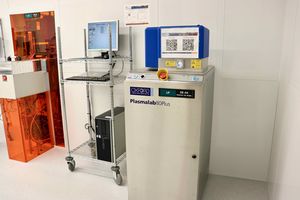Difference between revisions of "Oxford 80 Plus RIE"
Jump to navigation
Jump to search
| Line 38: | Line 38: | ||
===== Protocols and Reports ===== | ===== Protocols and Reports ===== | ||
| − | * '''SiO<sub>2</sub> via CF<sub>4</sub>''' | + | * [https://repository.upenn.edu/scn_tooldata/36/ '''SiO<sub>2</sub> etch via CF<sub>4</sub>''' ] |
| − | * '''SiN<sub>x</sub> via CF<sub>4</sub>''' | + | * [https://repository.upenn.edu/scn_tooldata/37/ '''SiN<sub>x</sub> via CF<sub>4</sub>'''] |
| − | * '''SiO<sub>2</sub> via CHF<sub>3</sub> + O <sub>2</sub>''' | + | * [https://repository.upenn.edu/scn_tooldata/38/ '''SiO<sub>2</sub> via CHF<sub>3</sub> + O <sub>2</sub>'''] |
* [https://repository.upenn.edu/scn_tooldata/39/ '''SiN<sub>x</sub> via CHF<sub>3</sub> + O <sub>2</sub>'''] | * [https://repository.upenn.edu/scn_tooldata/39/ '''SiN<sub>x</sub> via CHF<sub>3</sub> + O <sub>2</sub>'''] | ||
| − | * [https://repository.upenn.edu/scn_protocols/29/ | + | * [https://repository.upenn.edu/scn_protocols/29/ '''SiO<sub>2</sub> via CHF<sub>3</sub> + O <sub>2</sub>'''] |
| − | * [https://repository.upenn.edu/scn_tooldata/40/ | + | * [https://repository.upenn.edu/scn_tooldata/40/ '''Si and ZEP520A resist via CF<sub>4</sub>'''] |
| − | * [https://repository.upenn.edu/scn_protocols/55/ | + | * [https://repository.upenn.edu/scn_protocols/55/ ''' Comparison of Si and SiO<sub>2</sub> via CF<sub>4</sub> and CHF<sub>3</sub> + O <sub>2</sub>'''] |
==== Etch Rate ==== | ==== Etch Rate ==== | ||
Revision as of 13:52, 11 May 2023
 |
|
| Tool Name | Oxford 80 Plus RIE |
|---|---|
| Instrument Type | Etch |
| Staff Manager | Sam Azadi |
| Lab Location | Bay 2 |
| Tool Manufacturer | Oxford Instruments |
| Tool Model | 80+ |
| NEMO Designation | {{{NEMO_Designation}}} |
| Lab Phone | 215-898-9748 |
| SOP Link | QNF SOP |
Description
Oxford 80 Plus is an anisotropic dry etch tool. The main use of this tool is to etch SiO2, and SiNx to create hard masks for deep Si etch. However, it etches many other materials, including a variety of resists. The tool is connected to the following gases: Ar, O2, CF4, CHF3, SF6.
The plasma is ignited by the oscillating electric field created by the RF power at 13.56 MHz. The wafer is cooled down via passive cooling through a graphite chuck.
Applications
- Etch of SiO2
- Etch of SiNx
- Etch of Si
- Etch of resist
The following materials are not allowed in the chamber
- Au, Ag, PZT, ZnO, ITO, Pb, Zn, In
The following materials can not be exposed to plasma in the chamber
- SU-8, Cyclone, Polyimide
Standard Process Information
Protocols and Reports
Etch Rate
Recipe parameters are defined in the reports above.
Note: all rates are calculated from a full 4" wafers, small features may have lower etch rate.
- Etch rate of PECVD oxide and nitride are listed in the reports above.
- Etch rate of thermal SiO2 using CF4 recipe: 48 nm/min
- Etch rate of thermal SiO2 using CHF3/O2 recipe: 45 nm/min
- Etch rate of LPCVD SiNx using CF4 recipe: 50 nm/min
- Etch rate of LPCVD SiNx using CHF3/O2 recipe: 57 nm/min